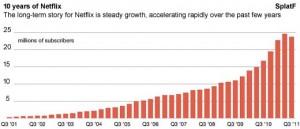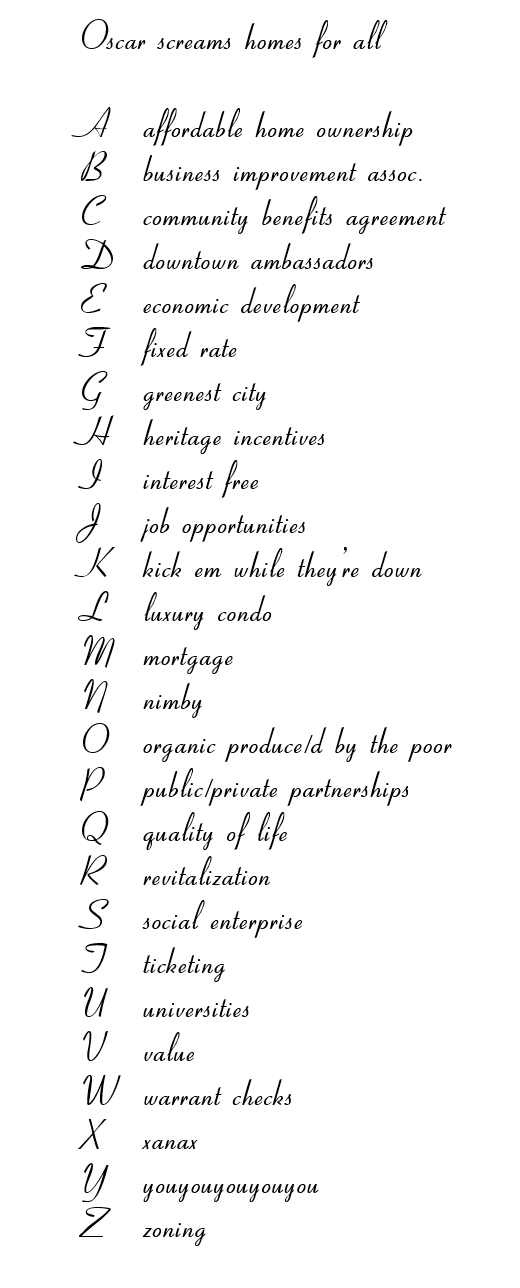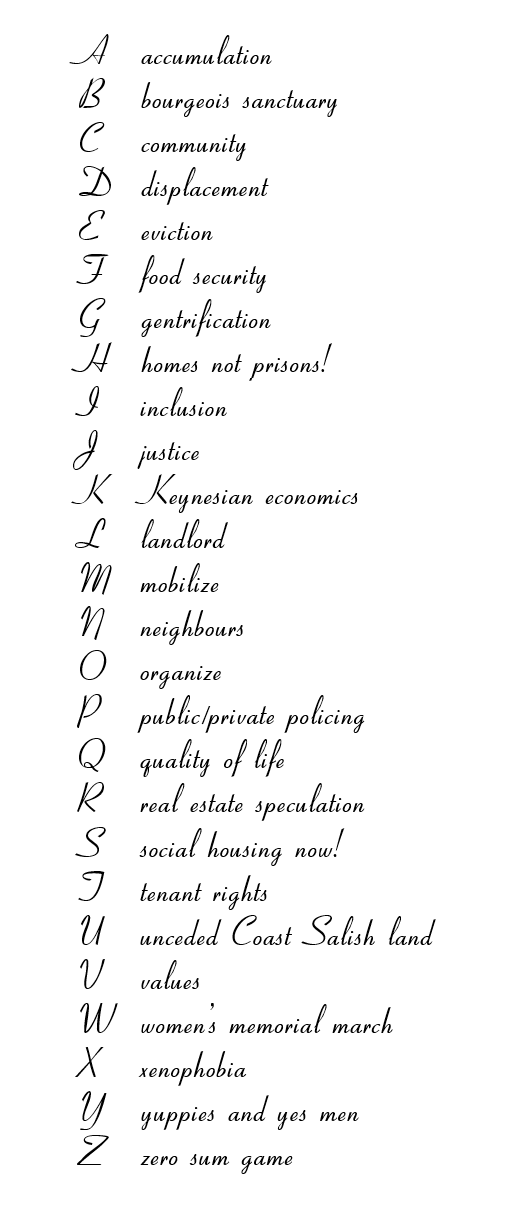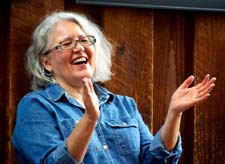Excerpt from Oscar of Between, Part 17A
by
Betsy Warland
604-681-1111. Yellow Taxi: “I’d like a cab for 9:30 at 1484 Charles Street, please.” The dispatcher replies “For Betsy?” [Oscar on their database] “Yes.” Despite the fact that Oscar is eager for her writing retreat she finds it hard to leave. Oscar could explain this to herself – it’s finally summer in Vancouver, or it’s intoxicatingly peaceful now that the construction is done – but it’s simply that she loves her home; home her closest companion.
The phone rings: the cab’s arrived. When the driver spots her coming, he jumps out and opens the trunk. “Good morning, sir.” Oscar, who has long ago desisted in correcting people, carries on. “And a good morning to you!” As the driver pulls away, they comfortably debate various routes then agree on Great Northern Way. [pause] Oscar notes that his friendly mood has changed, that he keeps glancing up to the mirror with furrowed brow of uncertainty.
He turns on the radio. A man’s voice sings unaccompanied.
“Morning prayers?”
He looks up in the mirror again.
“Yes. In Punjabi.”
After a few silent minutes they hit a bottleneck. He complains, “There’s road repairs everywhere.” Oscar retorts. “Yes, in the summer: road repairs and babies everywhere!” He laughs at this and they chat – discover that they both love babies – relax. The cab inching forward.
Sultry Montreal morn. The Plateau. Oscar in Denis’ nest-level apartment. Vancouver: Denis in hers. Outside Denis’ window the locust tree’s eleven oval leafs on either side of stem (with a solo one at each tip) shimmer like piano keys. Men’s directive voices. Hammering. Clanking of scaffolding going up. Construction, construction: for two years on either side of Oscar’s apartment and now here. Oscar turns her thoughts to her construction project: how to re-enter and build this manuscript after year and half absence. The finishing, proofing and promoting of Breathing the Page having gobbled up her already limited writing time. [here, Oscar sighs] The “lance” of “free.” Question of how not to fall upon its blade of never-say-no to work and other writers’ needs that Oscar understands all too well.
The ’60s popular sayings, “I need to take some space” and “Give me space!” Time inherent in space. Time + space = relationship. Oscar thinking how a change in any one of these initiates change in the other two. Within a few months,

Photo Credit: SplatF
Netflix wipes out three of the four video/DVD stores on The Drive, stores in which Oscar talked film with the staff. Gone. Time + space = relationship a-jumble. Sight of a young woman walking while reading text message – flash of sensuous smile on her face – Oscar stumbling into her intimacy amidst a teaming sidewalk. New iPad blanket ads in San Francisco’s BART rapid transit stations last December. Sequence of iPads propped up on user’s lap and raised thighs, his or her index finger touching screen just above user’s genitals. Only exception – African American man – finger
poised further up the screen (racism still intact).
He boards the BART train midday at Oakland City Center. Stands tentatively just inside the sliding doors. Small man lost in layers and layers of clothing and too-large

Photo credit: Matthew Woitunski, Creative Commons, Image was cropped and re-coloured.

Guest Writer:
Mercedes Eng
Vancouver, BC
Mercedes Eng interview with Rob Mclennan



 Featured Reader:
Featured Reader:
Jonina Kirton
New Westminster, BC
www.sacredcirclesbook.com
I read Oscar’s Salon because…
I enjoy the way Betsy invites dialogue by offering us excerpts from her work and a guest writer. Sometimes the connection between the two pieces is difficult to see at first glance. I like the fact that sometimes we must work to find the connection. I also very much enjoy what follows… hearing what others have taken from the two pieces is often enlightening.
Profile
Jonina Kirton a Métis/Icelandic poet currently lives in New Westminster, BC. A graduate of Simon Fraser University’s Writer’s Studio she has been blessed with on-going mentorship from both Betsy Warland and Ingrid Rose. Her writing has been described as dark and delicate as she often explores death, desire and divination. Her work has been featured in between earth and sky anthology, V6A: Writing from Vancouver’s Downtown Eastside Anthology, home & away (an Anthology Chapbook), Enlightening Times UK, Other Tongues: Mixed – Race Women Speak Out Anthology, Pagan Edge, First Nations Drum, Toronto Quarterly, Quills Canadian Poetry Magazine, New Breed Magazine, emerge and a number of online journals. Her first collection of poetry and lyric prose, page as bone – ink as blood, will be released in the Fall of 2015 with Talon Books.




What a great image: the lance of free! It resonates within but also brings on a smile. I hear similar bitter/sweetness in your description of Oscar’s BART train ride. Thank you.
glad you mention that image betsy nuse: “lance” of “free”, brought ‘lancelot’ to mind—oscar a kind of knight clarifying with her pen-sword. there too in mercedes eng’s sharp alphabetical delineation: possessors & dispossessed. a new take on chivalry—heartful generosity.
Now when I feel frustrated with road construction, I will think of babies and of Oscar and the driver finding a way to connect and I will also think of “I” for inclusion.
There is so much pain in these two pieces but there is more… I feel concern, compassion in both pieces. Storytelling, words can help define a problem. No letting us off the hook they dig deep then offer more subtle insights as to just how much ‘otherness’ drives the bus if we let it. Once in they move our interior spaces around like chess pieces. An awareness here, an awareness there and we are opened to new worlds, other realities. Ingrid and Oscar’s gentle concern for this lost man feels very different than the fear the others on the train were experiencing. The others needed distance from this man, both emotionally and physically. They could at least leave a little room for concern for him.
We see how his words land in the mother who understandably wants to shield her child from the world of need that lives in the homeless. We cannot help but feel compassion for her. She has something to protect but don’t we all… even if it is just a little psychic turf. Anyone who has been poor, needed income assistance can tell you how little ‘turf’ you are left with by the time you are ‘processed’ through the system.
Although we do not know his story I imagine someone undone by life… perhaps a gentle soul who could not negotiate those exchanges with cab drivers who assume things. Perhaps too broken his anger took over and there were no more offerings of the olive branch of common ground that Oscar offers with the acknowledgment of morning prayers and babies.
In Betsy’s piece I feel a sense of Oscar’s psychic turf and Mercedes offers insights into how land/home play into this. Oscar moves out from a safe home into the world, a world in which they do not fully feel a part of but can negotiate as she knows how to maintain her inner turf. ‘Development’ encroaches re construction but there is less anger, some acceptance and more compassion. With the homeless man he is at the other end of all things related to land development and a world going too fast for him. He shuffles from place to place finding little warmth he begins to fear his own anger. He is an open book, on a train offering his innermost fears. I feel he is talking to himself. He fears what he might do to himself as he has turned all the rejection inward. I know I am making a story up from all the pieces of information offered but this is what we do in the absence of dialogue. I cannot ask him what he is afraid of… I can only imagine and I cannot imagine anything more frightening than having no home and having to sleep on the street.
I know what it is to not trust sleep as mine was often invaded by a drunken father who needed company when he got home. I can relate to that uncertainty that can replace the simple dignity of a safe place to rest. Sometimes happy other times enraged my father would take us on his nightly journeys. There is one difference though my uncertainty had some certainty. I knew the players, more or less what to expect but the homeless man is opened wide and raw to a world that no doubt feels very unsafe and it cracked him.
Mercedes takes us down the alphabet of despair and sneaks in collective movements. I like how she uses the subversive nature of language by mocking the language of progress and placing it next to words and phrases like “Women’s Memorial Walk” and “Unceded Coast Salish land” which bring us back to reality. In these movements there is anger but not one turned inward it is facing in the right direction and it is the wind in the sails of those who fight for change. This sad, lonely man on the train appeared to have turned his anger inward, to have given up and we all know that we are never more dangerous than when we have nothing to lose. Perhaps it is this fact that made his words so frightening.
~ All my relations ~ Jonina
p.s. Many thanks to Betsy for inviting me to be the guest reader this month. I so enjoy reading the pieces you offer and have found the conversation offers time to contemplate the meaning of each piece. Thank you Mercedes and Betsy for your offering of words and the invitation to dialogue.
These excerpts read like a decoder ring message.
Places for people.
Oscar, displaced. In Denis’ place. Construction around her creating new space.
Netflix taking over video store space, the virtual displacing the tangible. Now our entertainment requires less space, but that hasn’t freed up any space for, say, empathy. People in need: the man on the train.
D displacement
E eviction
The space around us is getting bigger (personal space) and we like it that way.
B bourgeois sanctuary
The mentally ill get right inside personal space and poke around. Where else is there? “I’m afraid of me. Afraid of you. I don’t know what to do. I’m so afraid. I can’t go on like this. I’m so afraid … afraid what I might do to you.”
Way to cut to the chase, buddy. Right on the nose.
Cringe at the mother’s choice to cover her daughter’s ears. But I empathize. What else can you do but protect your kids?
M mobilize
N neighbours
O organize
S social housing now!
Mercedes and I met in person (we had before on the page) last April. We were the featured readers in Lunch Poems at SFU. It was left up to us to decide the reading order. As we discussed it Oscar experienced something she rarely experiences. When she acknowledged her reading would be “kinda heavy” Mercedes immediately replied “Mine is too!” And, they laughed with mutual relief. It was an intense reading in which everyone was deeply engaged and Oscar knew she wanted to “read” again with Mercedes in the salon. Mercedes’ line “Y youyouyouyouyou” will forever be lodged in Oscar’s head.That said, you dear readers, continue to be the salon. One thing that struck me about the comments this month is the ways in which you are extending our texts with your own thoughts and writing. Taking it further! This is when writing is at its full force.